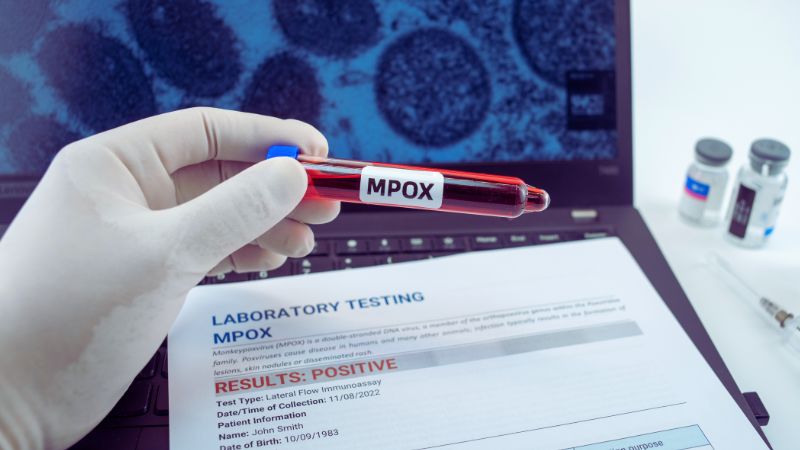WHO Director-General Dr Tedros Adhanom Ghebreyesus has determined that the upsurge of mpox in the Democratic Republic of the Congo (DRC) and a growing number of countries in Africa constitutes a public health emergency of international concern (PHEIC) under the International Health Regulations (2005) (IHR).
Mpox, which was previously known as Monkeypox, was a rare viral infection that was endemic in Central or West Africa, but since May 2022 there has been an outbreak of cases reported from non-endemic countries.
While the virus is not a sexually transmitted infection, it has been found predominately in male same-sex communities. People who are at high risk of being infected by the virus are encouraged to get a vaccination.
The virus is usually spread from person-to-person by prolonged physical or intimate contact with someone who has mpox, especially with skin rashes, lesions, sores or scabs.

Mpox can start with flu-like symptoms, such as fever, headaches and muscle aches and pains. It causes a rash or skin lesions and swollen lymph nodes.
Symptoms can occur up to 21 days after being exposed to mpox.
“The emergence of a new clade of mpox, its rapid spread in eastern DRC, and the reporting of cases in several neighbouring countries are very worrying. On top of outbreaks of other mpox clades in DRC and other countries in Africa, it’s clear that a coordinated international response is needed to stop these outbreaks and save lives.” Dr Tedros said on 14th August.
WHO Regional Director for Africa Dr Matshidiso Moeti said, “Significant efforts are already underway in close collaboration with communities and governments, with our country teams working on the frontlines to help reinforce measures to curb mpox. With the growing spread of the virus, we’re scaling up further through coordinated international action to support countries bring the outbreaks to an end.”
Committee Chair Professor Dimie Ogoina said, “The current upsurge of mpox in parts of Africa, along with the spread of a new sexually transmissible strain of the monkeypox virus, is an emergency, not only for Africa, but for the entire globe. Mpox, originating in Africa, was neglected there, and later caused a global outbreak in 2022. It is time to act decisively to prevent history from repeating itself.”
The disease was first discovered in humans in 1970. The disease is considered endemic to countries in central and west Africa.
In July 2022, the multi-country outbreak of mpox was declared a PHEIC as it spread rapidly via sexual contact across a range of countries where the virus had not been seen before. In 2024 there has been a global resurgence and Australia has reported more cases in the current outbreak than two years ago.
International AIDS Society calls for vaccines to be distributed in Africa countries effected by the outbreak
The International AIDS Society (IAS) is leading call for the immediate distribution of effective mpox vaccines amid the upsurge in mpox in the Democratic Republic of the Congo (DRC) and across many other African countries.
“The IAS urges a three-pronged response: rapid and unbureaucratic vaccine delivery to African countries, the establishment of rapid and free testing facilities within communities, and clear non-stigmatizing messaging to inform communities about symptoms and how to prevent the spread,” IAS President Beatriz Grinsztejn stated.

The IAS said emerging mpox strain, which is transmitting through sexual networks and close household contacts, is an emergency not only for Africa but globally. The continued transmission of the 2022-23 strain also poses serious concerns, especially among people who are immunocompromised, including people with advanced HIV, who are more likely to develop severe illness.
“There is an urgent need to continue searching both therapeutic and preventive measures for all mpox virus clades and to foster a unified global health response to ensure a coordinated and equitable approach to this crisis, which disproportionately affects low- and middle-income countries,” Grinsztejn added.
The mpox outbreak underscores the need for increased global cooperation and the transfer of knowledge and vaccine manufacturing capabilities to support and empower the affected regions. According to IAS President-Elect Kenneth Ngure.
“This outbreak highlights the urgent need for a global pandemic treaty, as well as enhanced local scientific expertise and medical manufacturing, which would enable countries to respond more quickly to emergencies.” Ngure said.





